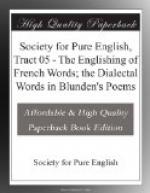25.
’Dull streams
Flow flagging in the undescribed deep fourms
Of creatures born the first of all, long
dead’. (67)
#Fourm#, explained as a ‘hare’s lurking place’, commonly called form, widely used and understood because the lair has the shape or form of the animal that lay in it. But perhaps it was originally only the animal’s seat or form, as we use the word in schools. Form has so many derivative senses that it would be an advantage to have this one thus differentiated both in spelling and sound.
26. ‘Toadstools twired and hued fantastically’. (68)
Though the word #twired# is not explained in Mr. Blunden’s glossary and the meaning is not evident from the context, we guess that he is using it here of shape, in the sense of ‘contorted’, which would range with the quotation from Burton (given in some dictionaries) ’No sooner doth a young man see his sweetheart coming, but he ... slickes his haire, twires his beard [&c.]’. Here twires, as latest edition of O.E.D. suggests, may be a misprint for twirls. Older dictionaries give wrong and misleading definitions of this word; and a spurious twire, to sing, was inferred from a misreading ‘twierethe’ for ‘twitereth’ in Chaucer’s Boethius, III m. 2. Modern authorities only allow twire, to peep, as in Shakespeare’s 28th Sonnet,
‘When sparkling stars twire not, thou gildst the even’
(whence some had foolishly supposed that twire meant twinkle) and in Ben Jonson, Sad Shepherd, II. 1, ’Which maids will twire at, ’tween their fingers’. The verb is still in dialectal use: E.D.D. explains it ‘to gaze wistfully or beseechingly’.
27. ’The tiny frogs Go yerking’. (69)
#Yerk.# The intrans. verb is to kick as a horse. The trans. verb is quoted from Massinger, Herrick, and Burns, who has ’My fancy yerkit up sublime’: i.e. roused, lashed.
28. ‘There seems no heart in wood or wide’. (8)
#Wide# as a subst. is hardly recognized. Tennyson is quoted, ’The waste wide of that abyss’, but as waste is a recognized substantive the authority is uncertain.
In the above examples we have taken such words as best answered our purpose, neglecting many which have almost equal claims. The richness of the vocabulary in unusual words and in words carrying unusual meanings forbids complete examination; as will be seen by a rough classification of some of those which we have passed over.
To begin with the words which our author uses well, we will quote as an example all the passages in which #writhe# occurs. The transitive verb which is perhaps in danger of neglect is very valuable, and it is well employed. These passages will also fully exhibit the general quality of Mr. Blunden’s diction.




